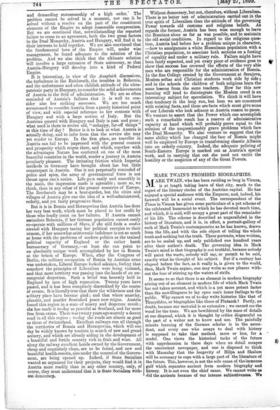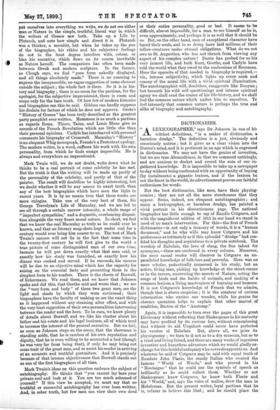MARK TWAIN'S PROMISED BIOGRAPHIES.
ATARK TWAIN, who has been residing so long in Vienna, is at length taking leave of that city, much to the regret of the literary circles of the Austrian capital. He has enjoyed a special audience with the Emperor, and, indeed, his farewell will be a social event. The correspondent of the Times in Vienna has given some particulars of a pet scheme of the celebrated humourist to which he has devoted much time, and which, it is said, will occupy a great part of the remainder of his life. The scheme is described as unparalleled in the history of literature, and it is, in effect, a portrait-gallery of such of Mark Twain's contemporaries as he has known, drawn from the life, and with the sole object of telling the whole truth and nothing but the truth. These portraits, when written, are to be sealed up, and only published one hundred years after their author's death. The governing ides, in Mark Twain's mind is that biography is not truthful, because nobody will paint the warts, nobody will say, or permit to be said, exactly what he thought of his subject. But if a century has elapsed before the fact, as it really is, is given to the world, then, Mark Twain argues, one may write as one pleases with- out the fear of stirring up the waters of strife.
It seems to us that there is an element in modern biography arising out of an element in modern life of which Mark Twain has not taken account, and which is a yet more potent factor than the unwillingness to lay open one's inner feelings to the public. Why cannot we of to-day write histories like that of Thucydides, or biographies like those of Plutarch Partly, no doubt, because our material is so extensive ; we cannot see the wood for the trees. We are bewildered by the mass of details at our disposal, which it is thought by critics disgraceful on the part of a writer not to know and use. The painfully minute learning of the German scholar is in the ascen- dant, and every one who essays to deal with history is supposed to take that method, more or less, for a model. One views the historical tasks of the future with apprehension in these days when no detail escapes the omniscient newspaper, and one is disposed to think with Macaulay that the longevity of Hilpa and Shalum will be necessary to cope with a large part of the literature of the future. This, however, is not the sole cause of the immense gulf which separates ancient from modern biography and history. It is not even the chief cause. We cannot write as did the ancients because of our intense subjectiveness. We put ourselves into everything we write, we do not see either man or Nature in the simple, truthful, literal way in which the writers of• Greece saw both. Take up a Life by Plutarch, and note how simple and direct it is. Plutarch was a thinker, a moralist, but when he takes up the pen of the biographer, his ethics and his subjective feelings do not in the least degree interfere with, colour, or bias his narrative, which flows on its course inevitable • as Nature herself. The comparison has often been made between Greek and modern sculpture. In the former, as Clough says, we find "pure form nakedly displayed, and all things absolutely made." There is no yearning to express the inexpressible, no vague suggestion of some element outside the subject ; the whole fact is there. So it is in his- tory and biography ; there is no room for the partisan, for the apologist, for the subjective impressionist, there is room and scope only for the bare truth. Of how few of modern histories and biographies can this be said. Gibbon can hardly suppress his disdain for factors of which he does not approve. Grote's "History of Greece" has been truly described as the greatest party pamphlet ever written. Mommsen is as much a partisan as regards Rome. Thiers, Take, and Louis Blanc give us records of the French Revolution which are little else than their personal opinions. Carlyle has interleaved with personal comments his biography of Cromwell. Macaulay's "History" is an eloquent Whig monograph, Froude's a Protestant apology. The modern writer, in a word, suffuses his work with his own personality, from which he finds escape impossible. He is always and everywhere an impressionist.
Mark Twain will, we do not doubt, write down what he thinks to be a real portrait of some celebrity he has met. But the truth is that the writing will be made up partly of the personality of the celebrity, and partly of that of the painter. The result will doubtless be highly interesting, but we doubt whether it will be any nearer to exact truth than any of the best biographies which have seen the light in recent years. It is by no means true that these works are mere eulogies. Take one of the very best of them, Sir George Trevelyan's Life of Macaulay, and we are led to see all through a certain narrow intensity, a whole range of "imperfect sympathies," and a dogmatic, overbearing disposi- tion alongside the very finest moral nature. In short, we feel that we know the real Macaulay as truly as he could ever be known, and that no literary snap-shots kept under seal for a century would ever bring him nearer to us. The test of Mark Twain's success will not lie in the fact that some time in the twenty-first century he will first give to the world a true picture of some distinguished man of our own time, • because he will put down exactly what that man said, or exactly how his study was furnished, or exactly how his • dinner was cooked and served. If he succeeds, his success will be due to an objective mind which has the capacity for seizing on the essential facts and presenting them in the simplest form to his readers. There is the charm of Boswell, of Eckermann. We read them, and we know that Johnson spoke and did this, that Goethe said and wrote that ; we see the "very form and body" of these two great men, see the light' and shade by which they were environed ; their biographers have the faculty of making us see the exact thing as it happened without any straining after effect, and with the very least suggestion of their own personalities intervening between the reader and the hero. To be sure, we know plenty of details about Boswell, and we like his chatter about his father and his estate and his legal business, all of which tend to increase the interest of the general narrative. But we feel, as soon as Johnson steps on the scene, that the showman is standing aside, that he is careless of his own reputation and dignity, that he is even willing to be accounted a fool (though • he was very far from being that), if only he may bring out some trait of the great man, and so assist his reader in arriving at an accurate and truthful portraiture. And it is precisely because of that intense objectiveness that Boswell stands out as one of the first biographers of all time.
Mark Twain's ideas on this question embrace the subject of autobiography. He thinks that "you cannot lay bare your private soul and look at it. You are too much ashamed of yourself." If this view be accepted, we must say that no truthful or successful autobiography has ever been written. And, in sober truth, but few men can view their own deed or their entire personality, good or bad. It seems to be difficult, almost impossible, for a man to see himself as he is even approximately, and perhaps it is as well that it should be so. But, on the other hand, men of exceptional character have bared their souls, and in so doing have laid millions of their fellow-creatures under eternal obligations. What do we not owe to St. Augustine, who has not shrunk from viewing any aspect of his complex nature ? Dante has probed for us his very inmost life, and both Kant, Goethe, and Carlyle have told the world what they owed to the confessions of Rousseau. Here the opposite of that needed in biography is required,— viz., intense subjectivity, which lights up every nook and cranny of the moral life with a vivid spiritual illumination. The autobiographist will, doubtless, exaggerate like Bunyan ; but beneath his wild self- questionings and intense spiritual agony we shall read the course of his life-history, and we shall feel the common nature which unites him to ourselves. Tc feel intensely that common nature is perhaps the true end alike of biography and autobiography.







































 Previous page
Previous page